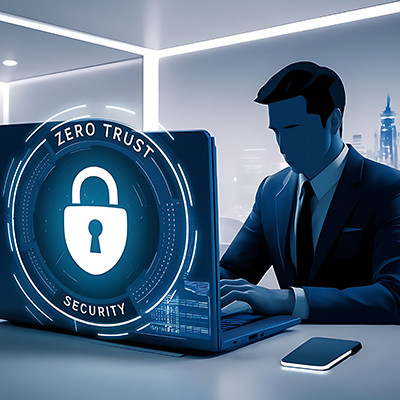Would you feel safe staying at a hotel that, instead of unique locks, each door used the same key as all of the others? Probably not—because if someone got in, they could take whatever they wanted. That’s similar to how old-school cybersecurity worked. Once someone got into a company’s network, they could access almost everything, making it easy for hackers to steal information. But today, many businesses use a better security framework called zero-trust security. In today’s blog, we discuss what zero-trust security is and why it’s safer.
What Is Zero-Trust Security?
Zero-trust security is all about being extra careful. It means that nothing and no one inside a company’s network is trusted automatically. Instead, everything has to prove it has permission to be there, even if it’s already inside the network.
Returning to our hotel example, imagine that the hotel used a unique lock on each room's door instead of using a marginally better version of the honor system. Even if someone managed to find your floor, they still can’t get in the room unless they have your room’s access code. Zero-trust security works the same way by adding multiple layers of security to keep data safe.
How Does Zero-Trust Security Work?
For zero-trust security to work, companies need to focus on these seven things:
- Users - The company needs to know who is trying to get into its network and make sure each person only sees what they need for their job. For instance, people in sales wouldn’t have access to financial records, and engineers wouldn’t be able to see private HR documents.
- Devices - Every computer, tablet, and phone connecting to the network needs to be safe. Companies make sure devices have the latest updates and security settings, and they check to see if each device is allowed to connect.
- Networks - Different parts of the network are locked down, so only people who need to use them can access them. Firewalls and other tools help block out anyone who shouldn’t be there.
- Applications - Companies keep all the software they use up-to-date and secure. This ensures no one uses unsafe programs that could let hackers in.
- Data - Data is super valuable, so companies protect it with encryption (which turns data into code) and other strong security tools to keep it safe from people who shouldn’t see it.
- Automation - Computers can help by watching the network for unusual behavior, like a hacker trying to get in. This helps companies stop threats faster than if a person had to notice on their own.
- Analytics - By tracking everything happening on the network, companies can spot warning signs early and stop problems before they become big issues.
Why Zero-Trust Security Matters
Zero-trust security is all about being cautious and making sure every user and device proves it’s allowed to be on the network. By checking everything—even what’s already inside—companies can ensure their information stays safe.
Want to know more about keeping your business secure? Give the IT professionals at Coleman Technologies a call today at (604) 513-9428 to learn more.




